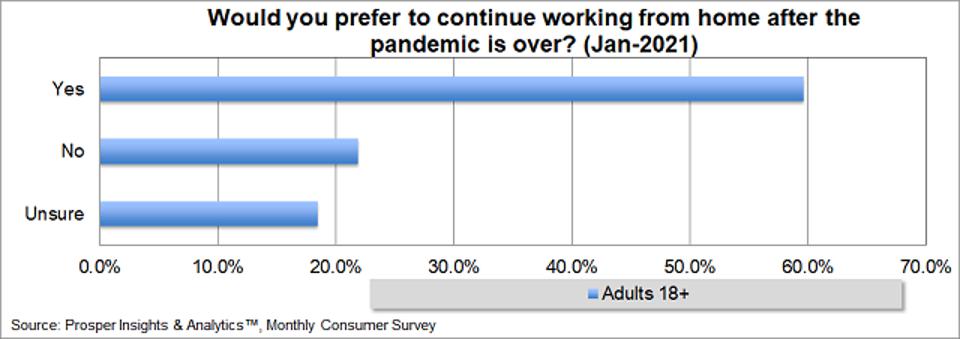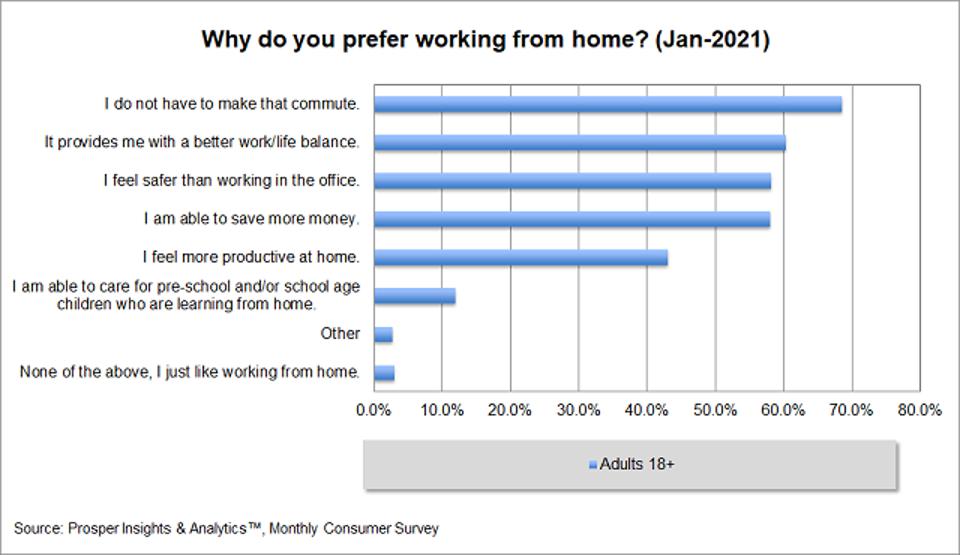The Covid-19 pandemic created history’s biggest remote work experiment yet. Businesses and employees swiftly adapted their daily lives and learned how to conduct their work remotely, while finding ways to remain productive. As we start to see a glimpse of the light at the end of the tunnel, questions arise about the long-term impact. Has the pandemic changed the way we work forever?
To better understand the impact on the way we work today, and in the future, I recently connected with Michael McDaniel, vice president and general manager, Modern Workplace at DXC Technology. DXC is the largest provider of workplace services, supporting more than 1,000 workplace customers across the globe.
During our discussion, Mike shared insights regarding how the pandemic has affected the way we work today, key components of the modern workplace and what the future of work might look like.
Gary Drenik: Obviously the Covid-19 pandemic has transformed the way we work. Will we ever go back to pre-pandemic ways of working?
Michael McDaniel: In short, no, we will never fully go back to pre-pandemic ways of working. In speaking with our workplace clients, the general consensus is that Covid-19 has changed the landscape forever. Many companies want to continue the remote work trend, acknowledging that it gives them access to better talent and allows people to be more productive with the extra time saved from commuting and travel.
Most employees want to work remotely too. A new Prosper Insights & Analytics survey found that 60% of adults want to continue working from home after the pandemic is over. Further, 69% indicated the lack of a commute as a key reason they prefer it.

With that said, I don’t expect the physical office to become a thing of the past entirely. Rather, it is evolving from a place where we sit and do work to a space for collaboration, where we can bring people together to solve a specific problem and brainstorm new ideas.
At DXC, the majority of our people will be working remotely moving forward as part of the “new DXC.”
Drenik: As the workplace has evolved over the past 12 months, have employee expectations evolved too?
McDaniel: Certainly, employee expectations have evolved in a major way, but that’s not unique to what’s happened in 2020. In fact, it has been happening over time as people have become accustomed to interactive experiences in their daily lives. The workforce now includes a whole generation of employees who were brought up in the era of social media.
Today’s employees are looking for a more personalized experience, customized to how they, on an individual basis, like to accomplish work. For example, some people prefer video calls to interact with team members, while others best consume information when delivered in text form. Businesses will need to change the workplace platform and make it more consumer-centric to accommodate the demands of the next-generation worker.
Drenik: What does a next-level employee experience look like and how does it play out in the modern workplace?
McDaniel: The next-level employee experience looks like something akin to the everyday consumer experience. Employees are consumers too and they expect the same seamless, personalized experience at work. A recent Prosper Insights & Analytics survey found four in 10 adults 18+ make purchases on their smartphones. Businesses need to create an experience similar to shopping and buying on a smartphone at work.
As people complete their work remotely, they need access to the proper technology to do their jobs. But today’s IT experience doesn’t factor in the consumer element. Employees don’t want to call an 800 number to solve an IT problem. This process needs to become as easy as it is to shop and buy on a smartphone. The modern workplace should provide a consumer-based experience absent of IT speak. That is a prime focus of the “new DXC” and our employee experience moving forward.
From a product development perspective, the modern workplace will make better use of analytics. Using analytics, you can gain an understanding of how employees are collaborating, how machines are performing and how employees are interacting with IT. These insights help to inform decisions around new product development that ultimately fuel advancement in the workplace industry.
Drenik: What should businesses be thinking about now as they look toward creating a modern workplace experience?
McDaniel: The first thing is to determine exactly what problem(s) businesses are trying to solve for. From there, they can develop a strategy around what they need for the future of their business.
Second, businesses need to understand their people. This is essential to creating a personalized employee experience. Once you understand your people, you can determine what they really need to do their jobs effectively. A common mistake is considering this to be a static, one-and-done effort. The truth is that it is dynamic, something that needs to be constantly evaluated and adjusted.
Finally, reevaluate the processes of how employees are doing their work and determine what needs to change. For example, if businesses don’t change the process around the way they evaluate employee performance as they evolve everything else related to the workplace, then they can’t expect to effectively change anything.
Drenik: There’s been a lot of talk about the future of work, even before the pandemic transformed work as we know it. Obviously, no one knows what the future entails, but pretend you’re holding a crystal ball for a moment. What does the future of work look like in your mind? How is it different from how we work today?
McDaniel: Great question. I see three major differences from how we work today.
First, as we increasingly improve collaboration to fuel better ideas, we’ll start to see innovation happening faster. Historically, we haven’t always had the right people in the room to achieve diversity of thought due to logistical challenges. That’s changing as virtual collaboration tools become stronger and interactions can occur anywhere. The more we can get the right people together without having to manage logistical obstacles like travel, the more innovation we will see.
Second, people will enjoy a better work-life balance. As employees gain better access to information and processes become more efficient, productivity will increase as well, freeing up more personal time on a daily basis. This is of huge importance to many people. In a recent Prosper Insights & Analytics survey, 60% of adult participants indicated they prefer working remotely because it offers a better work-life balance.

Lastly, we will likely see an evolution in the human aspect of work. As humans, we look for interactions on a daily basis, including at work. The future of work will allow for more personal connections, beyond work-specific interactions. This is one area that is ripe for innovation and I expect to see a lot of advancement in the coming years.




